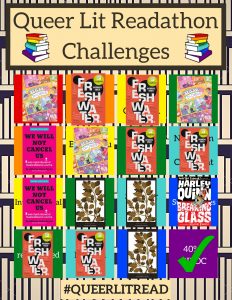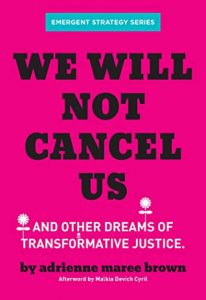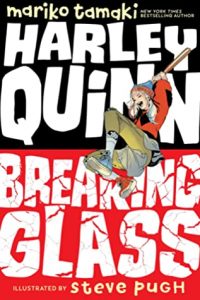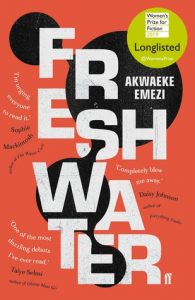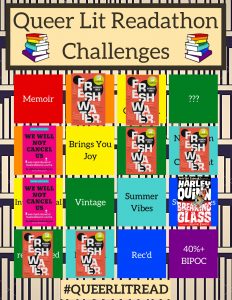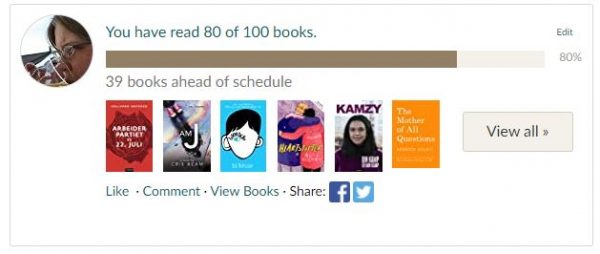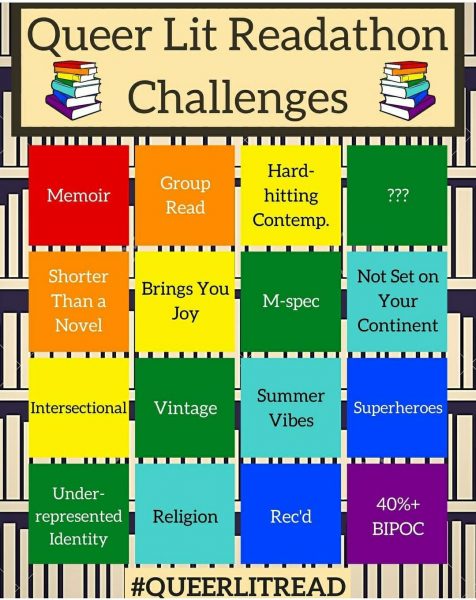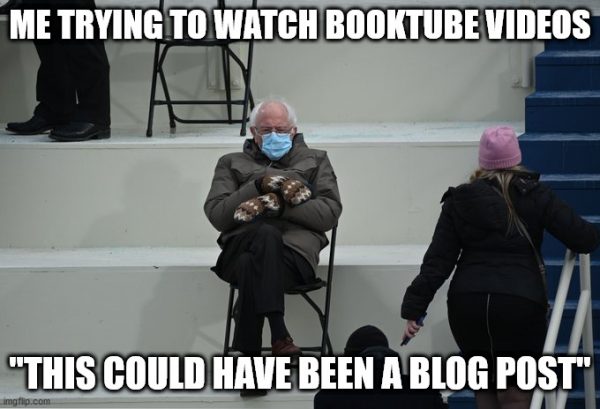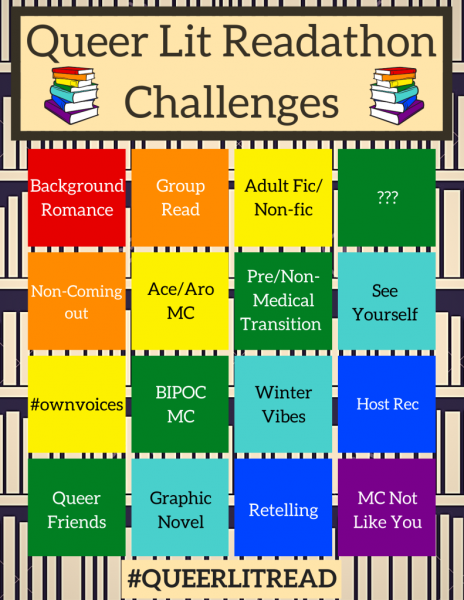It’s been a few weeks, but here’s a belated summary of my Queer Lit Readathon reading.
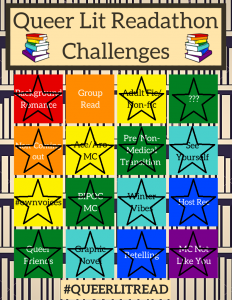
This Winter by Alice Oseman checks off Background Romance, Non Coming Out and Winter Vibes. I thought Tori was Ace according to canon, so that This Winter would count for Ace/Aro MC, too, but I think I may have been wrong about that.
Love Lives Here by Amanda Jette Knox was my pick for Adult Fiction/Nonfiction (the latter, obvs), ???, and See Yourself (I am Cis, and so is Amanda).
George by Alex Gino covers Pre/Non-Medical Transition.
The Black Flamingo by Dean Atta covers #ownvoices, BIPOC MC and MC Not Like You.
Only Mostly Devastated by Sophie Gonzales was picked for Retelling, but also works for Host Rec and Queer Friends.
Lumberjanes vol. 9: On a Roll squeezed in to cover Graphic Novel.
So that’s every square checked (well, with some doubt about Ace/Aro MC), except the group read. I ordered Summer of Everything by Julian Winters at the same time as Only Mostly Devastated, and it was supposed to arrive on time according to the estimates from the shop, but alas. It would have been a challenge to finish it within the readathon week in any case, but without the book in hand it was obviously impossible. It has arrived now, though, so it will be read eventually.
I have, to a certain extent, been prioritising reading over blogging about the books I’ve read over the last few months (if not longer), so to make sure I get these written up I will stick to a very brief summary of my thoughts for each of them here, rather than pretend to myself that I’ll do a proper review of them at some later point.
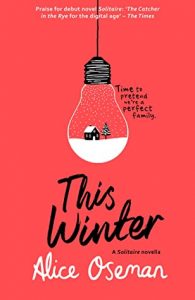 This Winter by Alice Oseman is a novella that takes place after the three volumes of Heartstopper that are already out and before Solitaire (which I’ve since read). It is narrated by the three Spring kids, Tori, Charlie and Oliver, who each get a section in order of age from oldest to youngest. It is also illustrated in Oseman’s characteristic style. The whole of the plot takes place on Christmas day. The book comes with a content warning, in that it references mental illness and eating disorders and includes «ignorant views regarding mental illness» (a wording which I particularly liked).
This Winter by Alice Oseman is a novella that takes place after the three volumes of Heartstopper that are already out and before Solitaire (which I’ve since read). It is narrated by the three Spring kids, Tori, Charlie and Oliver, who each get a section in order of age from oldest to youngest. It is also illustrated in Oseman’s characteristic style. The whole of the plot takes place on Christmas day. The book comes with a content warning, in that it references mental illness and eating disorders and includes «ignorant views regarding mental illness» (a wording which I particularly liked).
Tori and Charlie are trying to put a rather rough autumn/winter behind them, and for Tori that means trying to protect Charlie as well as dealing with her own «disasterous» life. Charlie seems to want to escape from himself (and his family). Oliver mainly wants someone – preferably his elder siblings – to play Mario Cart with him. The novella is a moving and insightful portrait of a family dealing with mental illness, and of how everyone is unavoidably tied up in the situation, though the way they try to deal ranges from trying too hard to help to pretending nothing is wrong (or even, in the extended family, making fun of the whole thing).
This is Tori:
I walk back into the kitchen. Mum is still washing up. I walk up to her, and her face looks like stone. Like ice, maybe. There’s a pause, and then she says, ‘You know, I am trying my best.’
I know she is, but her best isn’t really good enough, and it shouldn’t be about how she feels anyway.
(Page 44.) It’s hard not to feel like the Spring parents are fumbling at their parenting job, but as a parent myself, who has not had personal experience with mental illness, I’m not all that sure I’d have done a much better job. Well, in fact, that is very much one of the reasons why I read books – like these and in general – in order to learn, to get the perspective of the struggling teens, in this case, letting me see the world from their point of view.
Here’s Charlie:
I should explain about the argument with Mum and all the arguments we’ve had over the past few weeks. I should explain how difficult it is to keep trying to do better when there are so many people who just refuse to understand how hard it is. I should explain that I barely slept last night because I was so anxious about dinner and, even though I actually did quite well, I still felt like everyone was watching me, waiting for me to fuck up and ruin the day.
(Page 72.) I started reading Solitaire at the tail end of the readathon, and I’m looking foreward to making my way though all of Oseman’s books, probably in the near future (I have purchased them all, so it’s just a matter of finding the time).
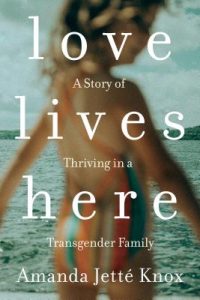 I came across Amanda Jetté Knox on Twitter a while back, and have been meaning to read her well, I guess we can call it a memoir? Love Lives Here was a very interesting, and in parts moving read. Someone on Goodreads called it a bit of a Trans 101, and I suppose there is something in that, if you’ve already read a bit about the issue and you’re looking to understand more about transness in itself, this is perhaps not where you should go.
I came across Amanda Jetté Knox on Twitter a while back, and have been meaning to read her well, I guess we can call it a memoir? Love Lives Here was a very interesting, and in parts moving read. Someone on Goodreads called it a bit of a Trans 101, and I suppose there is something in that, if you’ve already read a bit about the issue and you’re looking to understand more about transness in itself, this is perhaps not where you should go.
I did, however, find it interesting to get the coming-out-as-trans stories from the point of view of a cis woman, since I myself am cis, and moreover from the point of view of a parent. There is also quite a lot of discussion about advocacy, about being public as a family of supportive individuals, and being public in general. When Amanda’s partner suggest she uses her parenting blog as an advocacy platform, Alexis (then out as trans boy, now non-binary) makes a point:
«You should do that!» Alexis agreed. «When I searched for trans kids in Canada, I couldn’t find any stories of families who were supportive. Not one. We should be that one.»
(Page 99.) The frequency of sucicide and suicide ideation is already much higher in trans and non-binary kids, how much worse is a Google-search that tells them they will be thrown out from home and shunned by everyone they love going to make that situation? It is admirable to out oneself out there as the (sensible but apparently unusual) alternative: The loving and accepting family.
Interesting as this was, though, the next book I pick up about trans issues will be by a trans author. Time for some #ownvoices to teach this old cis lady about the myriad of human experience.
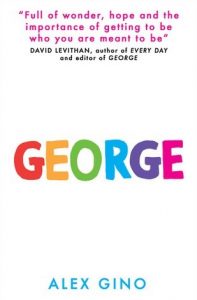
I read Rick by Alex Gino, which happens after George chronologically, a few weeks before the readathon. A pity, since it would have worked beautifully for Ace/Aro. Ah, well. In terms of order it didn’t make all that much difference to me that I read them «the wrong way round», but Rick does spoil George (quite a bit, and not just on the coming out parts which you could probably take a guess at either), so if you can stick to the proper order, do.
George is a sweet story, very much not intended for 46-year-olds. Which doesn’t mean we can’t read it, obviously, and certainly doesn’t mean we can’t learn from it. I don’t suppose it’s too much of a spoiler to say that it’s a book about being trans. In fact, if so, the synopsis will spoil it for me. George/Charlotte is lucky enough to have a best friend that sticks with her, a mother who, despite taking some time, comes round and an older brother who takes it all in his stride:
«Weird. But it kinda makes sense, No offence, but you don’t make a very good boy.»
«I know.»
(Page 156.) Which feeds into the theme from Love Lives Here: If we are going to make progress, we (and most especially trans/LGBTQ+ kids/teens) need stories with happy endings and families that are able to adjust and stick together and love one another, or else coming out is just going to remain as terrifying as it must have been for centuries.
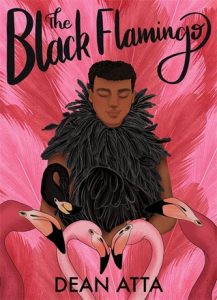 The Black Flamingo by Dean Atta was already on my TBR pile, suggested to me by who knows. The combination of it ticking several bingo boxes and being a relatively quick read, being in verse, made it the perfect pick for the readathon.
The Black Flamingo by Dean Atta was already on my TBR pile, suggested to me by who knows. The combination of it ticking several bingo boxes and being a relatively quick read, being in verse, made it the perfect pick for the readathon.
The narrative being from the first person perspective and the verse form combine to make this a hard-hitting read. The book fits the prompt «MC Not Like You» perfectly, Michael is my opposite in every element of the snappy shorthand descriptions we use to group people. He is male, mixed-race, gay and gender bending, I am cis female, white and straight. Even so, it is not difficult to empathise with Michael’s exploration of his identity, and his emergence towards the end of the book as ‘The Black Flamingo’, fierce, in drag, and wholly himself, is a triumph the reader shares.
Interspersed throughout the narrative are standalone poems by Michael. Here’s an example:
I Come From
I come from shepherd’s pie and Sunday
roast, jerk chicken and stuffed wine leaves.
I come from travelling through taste buds
but loving where I live. I come from
a home that some would call broken.
I come from DIY that never got done.
I come from waiting by the phone
for him to call. I come from waving
the white flag to loneliness. I come from
the rainbow flag and the Union Jack.
I come from a British passport
and an ever-ready suitcase. I come from
jet fuel and fresh coconut water.
I come from crossing oceans
to find myself. I come from deep issues
and shallow solutions.
I come from a limited vocabulary
but an unrestricted imagination.
I come from a decent education
and a marvellous mother.
I come from being given permission
to dream but choosing to wake up
instead. I come from wherever I lay
my head. I come from unanswered
questions and unread books, unnoticed
effort and undelivered apologies
and thanks. I come from who I trust
and who I have left.
I come from last year and last year
and I don’t notice how I’ve changed.
I come from looking in the mirror
and looking online to find myself.
I come from stories, myths, legends
and folk tales. I come from lullabies
and pop songs, hip-hop and poetry.
I come from griots, grandmothers
and her-story tellers. I come from
published words and strangers’ smiles.
I come from my own pen but I see
people torn apart like paper, each a story
or poem that never made it into a book.
(Pages 217-218.)
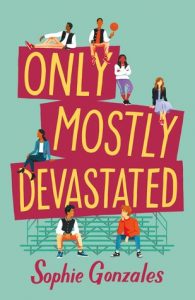 Only Mostly Devastated by Sophie Gonzales was suggested by one of the hosts for the «Retelling» prompt and I’m glad we crossed paths.
Only Mostly Devastated by Sophie Gonzales was suggested by one of the hosts for the «Retelling» prompt and I’m glad we crossed paths.
I found it to be a clever reworking of the Grease plot. In place of Sandy and Danny we find Ollie from California, plonked down in North Carolina because his parents want to stay near his aunt (who is very ill with cancer), and Will, basketball jock, definitely not out. The supporting cast is both charming and interesting (a bit like in the movie) and help bring the story to life. Quite apart from the summer-romance-oh-now-we’re-at-the-same-school-and-that-is-not-who-I-am-here plot, there are other echoes of Grease, not least in the gradual realisation of Ollie’s that while he is finding the situation tough, so is Will, and that if they want to have a chance at an actual relationship they both need to give as well as take. Even down to the words and phrases there are echoes. I feel the title (a phrase that appears in the book, too) sounds like «hopelessly devoted» in some intangible way (and it made me hum the song every time I thought about the title), but those words also appear:
If I didn’t cut Will off cold-turkey, I’d end up pining over him, all hopelessly devoted, and hurt, and unrequited.
(Page 79.) It’s been quite a few years since I last watched Grease, but I’m positive that a careful side-by-side comparison would reveal even more details that the two have in common than the many I spotted.
It’s more of a YA romance than I would normally read (I may be growing old after all, I have grown out of teen romance…), but the revamped Grease story and the nicely handled theme of coming out – how different the experience can be depending on your family, friends and local community (Ollie from liberal-minded California has been out «forever») – made it a much more interesting read than the plain boy-meets-boy-and-after-some-obstacles-they-live-happily-ever-after romance story.
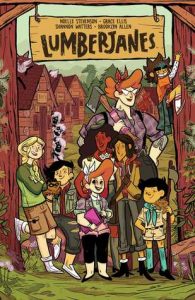 The Lumberjanes series is a firm favourite in this house. Some time in the autumn I resolutely purchased all the volumes we were missing from Waterstones. They propmtly disappeared into the teen’s room, but I have been asking for them back in order so I could (re)read the whole thing chronologically. In volume 9: On a Roll our heroes, the Roanokes, find an overground roller derby track and challenge a group of Sasquatches to a game, in order to help the neighbourhood Yetis whose digs the Sasquatches have taken over. This being Lumberjane-country, the track turns out to have… well, deadly booby traps.
The Lumberjanes series is a firm favourite in this house. Some time in the autumn I resolutely purchased all the volumes we were missing from Waterstones. They propmtly disappeared into the teen’s room, but I have been asking for them back in order so I could (re)read the whole thing chronologically. In volume 9: On a Roll our heroes, the Roanokes, find an overground roller derby track and challenge a group of Sasquatches to a game, in order to help the neighbourhood Yetis whose digs the Sasquatches have taken over. This being Lumberjane-country, the track turns out to have… well, deadly booby traps.
It’s unabashedly queer (yes, in both senses) and undeniably weird and unendingly charming.
Alle bøkene har jeg kjøpt sjøl.
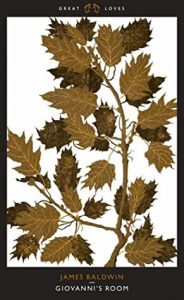 Giovanni’s Room by James Baldwin was not at all what I expected. I knew next to nothing about it on beforehand, and the only other Baldwin I’ve read is Go Tell it On the Mountain, and obviously I’ve heard a lot about his autobiographical writing. So I guess I had expected something along those lines. However, the fundamentally human aspects of Baldwin’s writing are abundantly present in Giovanni’s Room as well. It is present in the older gay men that have money, but very little else going for them. They may have been young and innocent and full of hope at some point, now they are happy (though happy is definitely the wrong word) to wring whatever scraps of prentend-affection they can out of the young men who depend on them for their income. It is present, of course, in Giovanni, who is, at least at the start of the book, still young and innocent and full of hope, though penniless, and in David, who both falls hard for Giovanni and keeps him at arms’ length, because he is unable to accept the fact that he is a guy that falls for guys.
Giovanni’s Room by James Baldwin was not at all what I expected. I knew next to nothing about it on beforehand, and the only other Baldwin I’ve read is Go Tell it On the Mountain, and obviously I’ve heard a lot about his autobiographical writing. So I guess I had expected something along those lines. However, the fundamentally human aspects of Baldwin’s writing are abundantly present in Giovanni’s Room as well. It is present in the older gay men that have money, but very little else going for them. They may have been young and innocent and full of hope at some point, now they are happy (though happy is definitely the wrong word) to wring whatever scraps of prentend-affection they can out of the young men who depend on them for their income. It is present, of course, in Giovanni, who is, at least at the start of the book, still young and innocent and full of hope, though penniless, and in David, who both falls hard for Giovanni and keeps him at arms’ length, because he is unable to accept the fact that he is a guy that falls for guys.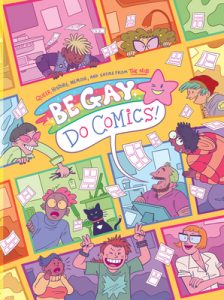 Be Gay, Do Comics is a graphic anthology that I picked up after someone mentioned it on Twitter. It features more than 30 cartoonists, and contains the aforementioned mini-memoirs as well as comics about all sorts of LGBTQ+ experiences and history. They vary from the merely very good to the quite excellent, and I will be looking out for the other work of quite a few of these creators.
Be Gay, Do Comics is a graphic anthology that I picked up after someone mentioned it on Twitter. It features more than 30 cartoonists, and contains the aforementioned mini-memoirs as well as comics about all sorts of LGBTQ+ experiences and history. They vary from the merely very good to the quite excellent, and I will be looking out for the other work of quite a few of these creators.